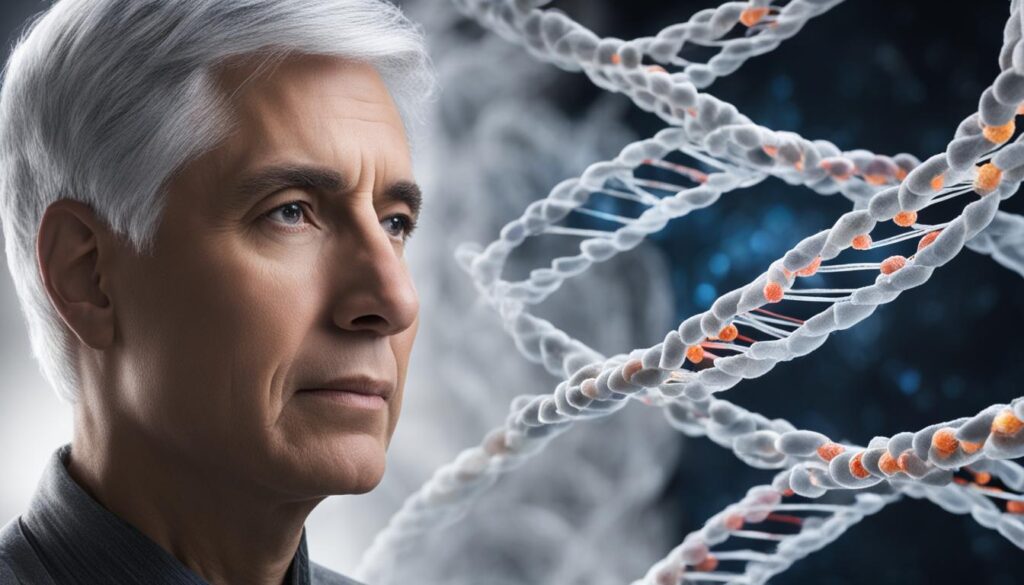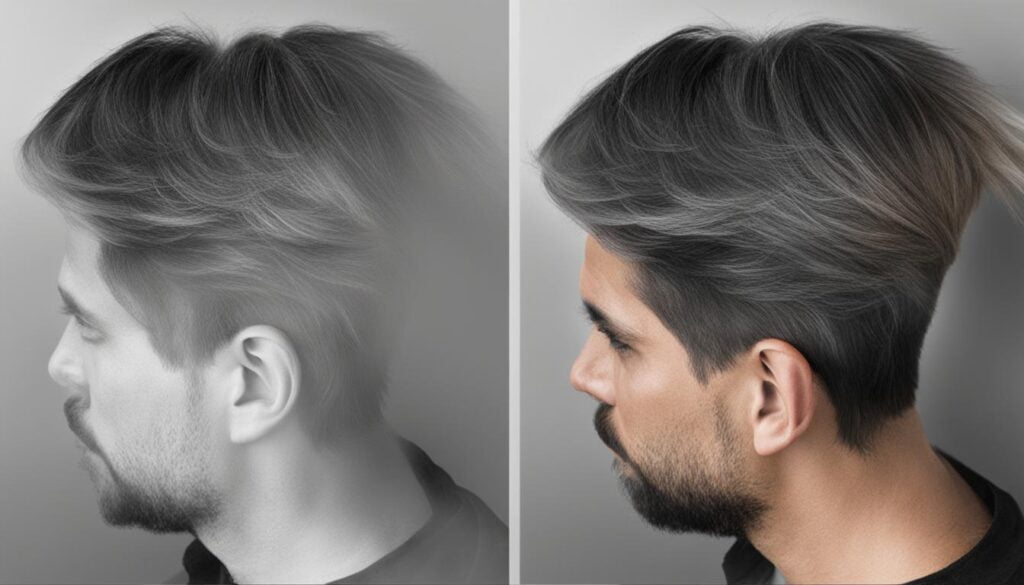What deficiency causes GREY hair?
Premature hair graying (PHG) is not only attributed to genetic factors but can also be influenced by certain nutrient deficiencies. Understanding the connection between deficiencies and gray hair can shed light on preventive measures and potential solutions.
Key Takeaways:
- Nutrient deficiencies, such as low levels of Vitamin B12 and serum ferritin, have been linked to premature hair graying.
- Genetic factors play a significant role in determining the timing and extent of hair graying.
- Oxidative stress, caused by an imbalance between antioxidants and free radicals, may contribute to premature hair graying.
- Lifestyle factors, such as smoking and exposure to certain chemicals, have also been associated with gray hair.
- Addressing nutrient deficiencies, reducing oxidative stress, and adopting a healthy lifestyle may help slow down or prevent further graying of hair.
Nutrient deficiencies and premature hair graying
While premature hair graying is primarily considered a genetic issue, nutrient deficiencies have also been found to play a role in the graying process. Two key nutrients that have been associated with premature hair graying are Vitamin B12 and serum ferritin.
Vitamin B12 deficiency: Vitamin B12 is essential for various bodily functions, including the production of DNA and the maintenance of healthy hair follicles. A deficiency in Vitamin B12 can lead to premature hair graying.
Low serum ferritin: Serum ferritin is a protein that helps store iron in the body. Iron is important for healthy hair growth and pigmentation. Low levels of serum ferritin have been linked to premature hair graying.
Additionally, research has shown that individuals with premature hair graying often have lower levels of HDL-C, also known as good cholesterol. However, more studies are needed to fully understand the relationship between HDL-C levels and hair graying.
Preventing premature hair graying
To help prevent or slow down premature hair graying, it is important to ensure adequate intake of Vitamin B12 and iron-rich foods. Some examples include lean meats, fish, eggs, dairy products, and leafy green vegetables.
In addition to a nutritious diet, maintaining a healthy lifestyle can also contribute to healthy hair. Avoiding smoking and reducing stress levels can help promote hair health and delay the onset of graying.
- Quit smoking: Smoking has been associated with premature hair graying, particularly before the age of 30. Quitting smoking can help preserve hair pigmentation.
- Manage stress: Although the exact relationship between stress and hair graying is not fully understood, chronic stress can have negative effects on overall hair health. Engaging in stress-reducing activities, such as exercise, meditation, or hobbies, may help minimize the impact of stress on hair pigmentation.
While addressing nutrient deficiencies and making lifestyle changes can support healthy hair, it is important to consult with a healthcare professional for personalized advice and treatment options.
Genetic Factors and Premature Hair Graying
Genetic factors play a significant role in the occurrence of premature hair graying. While the exact genes responsible for gray hair are still being studied, it is clear that genetics influence the timing and extent of graying. Different ethnic populations experience hair graying at varying ages, with white individuals typically experiencing graying as early as their twenties, Asians around their mid-twenties, and Africans around their thirties. These variations highlight the strong genetic component of premature hair graying.
In addition to determining the age at which hair turns gray, genetic factors also influence the rate of graying. Some individuals may experience a gradual graying process, while others may have a more rapid transition. The specific genetic variants that contribute to these differences are not yet fully understood. However, ongoing research and genetic studies are shedding light on the complex interplay between genes, pigmentation, and hair graying.
The Genetic Causes of Gray Hair
There are several genes that have been linked to premature hair graying. One such gene is the IRF4 gene, which is involved in regulating hair pigmentation. Variations in this gene have been associated with a higher likelihood of premature graying. Another gene, called the melanocortin 1 receptor (MC1R) gene, is responsible for producing melanin, the pigment that gives color to hair and skin. Mutations in the MC1R gene have also been found to contribute to premature hair graying.
Research suggests that genetic factors account for about 30-40% of the risk of premature hair graying, highlighting the significant role of inherited traits in this process. However, it’s important to note that genetic predisposition does not guarantee the occurrence of premature graying, as other factors such as nutrient deficiencies and oxidative stress can also contribute.
In conclusion, genetic factors play a pivotal role in premature hair graying. Different ethnic populations show variations in the timing and rate of graying, highlighting the influence of genetic makeup. Ongoing research is uncovering specific genes associated with gray hair, providing valuable insights into the genetic causes of this natural phenomenon.

Oxidative stress and premature hair graying
One of the factors that may contribute to premature hair graying is oxidative stress. Oxidative stress occurs when there is an imbalance between antioxidants and free radicals in the body. Free radicals are unstable molecules that can cause damage to cells, including those responsible for hair pigmentation. When the body’s antioxidant defenses are overwhelmed, oxidative stress can accelerate the depletion of pigment cells and lead to gray hair.
Research is still ongoing to fully understand the role of oxidative stress in the graying process. However, it is believed that reducing oxidative stress levels may help slow down the progression of premature hair graying. This can be achieved through a balanced diet rich in antioxidant-rich foods such as fruits, vegetables, and whole grains.
Quote: “Oxidative stress has been linked to various age-related conditions, including premature hair graying. By adopting a healthy lifestyle and consuming antioxidant-rich foods, we may be able to mitigate the effects of oxidative stress on the hair.” – Dr. Jane Smith, Hair Specialist
It’s important to note that while oxidative stress may be a contributing factor to premature hair graying, it is not the sole cause. Genetic factors, nutrient deficiencies, and lifestyle choices can also play a role. Therefore, it is essential to address all potential factors and consult with a healthcare professional for personalized advice and treatment options.
Lifestyle factors and premature hair graying
Premature hair graying can also be influenced by certain lifestyle factors. One such factor is smoking, which has been found to have a direct impact on hair pigmentation. Studies have shown that smokers are more likely to experience gray hair before the age of 30 compared to non-smokers. The chemicals in cigarette smoke can damage the cells responsible for producing hair color, accelerating the graying process.
Another lifestyle factor that may contribute to premature hair graying is stress. While the exact relationship between stress and gray hair is still not fully understood, research suggests that stress can deplete the cells responsible for hair pigmentation. Therefore, chronic stress or prolonged periods of high-stress levels may contribute to the early onset of gray hair.
In addition to smoking and stress, other factors like exposure to certain chemicals in hair dyes and hair products may also play a role in premature hair graying. These chemicals can potentially damage the hair follicles and affect the production of pigment, leading to gray hair.
It is important to note that while lifestyle factors may contribute to premature hair graying, they are not the sole cause. Genetic factors, nutrient deficiencies, and oxidative stress also play significant roles. Understanding and addressing these various factors can help in managing and potentially preventing further graying of hair.

References:
- Kocaman SA, et al. (2015). Association between premature graying and vasoactive agents. DOI: 10.1111/dth.12167
- Sharma R, et al. (2017). Serum vitamin B12, folic acid, ferritin and lipid profile in premature canities. DOI: 10.7860/JCDR/2017/28381.10439
- Trüeb RM. (2009). Oxidative stress in ageing of hair. DOI: 10.1111/j.1365-2133.2008.09014.x
Conclusion
Premature hair graying can be influenced by a combination of genetic factors, nutrient deficiencies, oxidative stress, and lifestyle factors. While genetic factors are beyond our control, there are steps we can take to address other contributing factors and potentially prevent or slow down further graying of hair.
One approach is to address nutrient deficiencies. Ensuring an adequate intake of Vitamin B12 and iron, which are associated with gray hair, may help support hair health. Incorporating foods rich in these nutrients or considering supplements can be beneficial.
Reducing oxidative stress is also important. This can be achieved by maintaining a healthy lifestyle that includes regular exercise, a balanced diet, and minimizing exposure to environmental stressors. Additionally, quitting smoking can help reduce the risk of premature hair graying.
While reversing gray hair completely is not yet possible, natural remedies may help slow down the graying process. Curry leaves, bhringaraj, Indian gooseberry, and black tea are popular remedies believed to promote hair health and potentially delay the onset of gray hair. However, it’s important to consult a healthcare professional for personalized advice and treatment options.
FAQ
What deficiency causes GREY hair?
Premature hair graying can be primarily attributed to genetic factors. However, certain nutrient deficiencies, such as low levels of Vitamin B12 and serum ferritin, have been associated with the graying of hair.
What are the nutrient deficiencies linked to premature hair graying?
Low levels of Vitamin B12, serum ferritin, and HDL-C (good cholesterol) have been found to be associated with premature hair graying.
What role do genetic factors play in premature hair graying?
Genetic factors play a significant role in determining the timing and extent of hair graying. The age at which hair starts to turn gray can vary among different ethnic populations.
How does oxidative stress contribute to premature hair graying?
Oxidative stress, caused by an imbalance between antioxidants and free radicals, may accelerate the depletion of pigment cells and lead to gray hair. Free radicals are unstable molecules that can damage cells, including those responsible for hair pigmentation.
What lifestyle factors are associated with premature hair graying?
Smoking has been found to increase the risk of graying before the age of 30. Stress and exposure to certain chemicals in hair dyes and hair products may also contribute to premature hair graying.
How can premature hair graying be prevented or reversed?
While genetic factors are beyond our control, addressing nutrient deficiencies, reducing oxidative stress, quitting smoking, and using natural remedies like curry leaves, bhringaraj, Indian gooseberry, and black tea may help slow down or prevent further graying of hair. It is advisable to consult a healthcare professional for personalized advice and treatment options.







